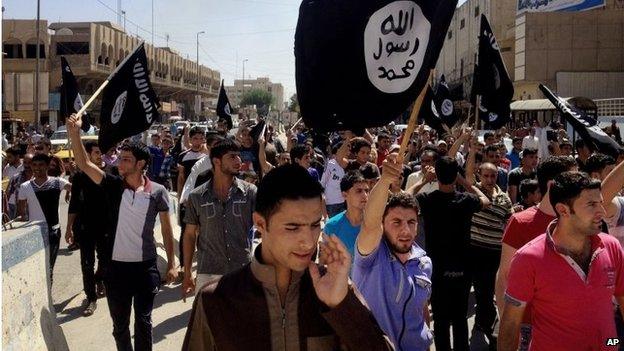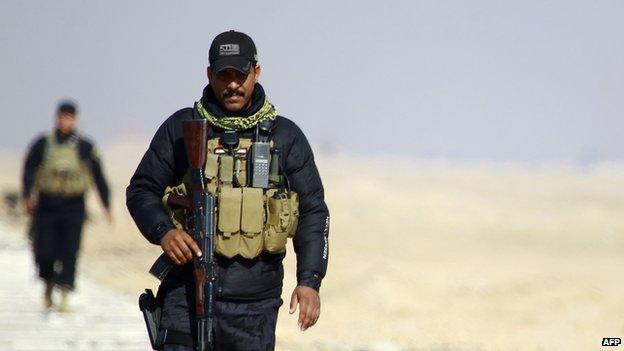Iraq-Kurdish force of 25,000 'to retake Mosul from IS'
- Published

Mosul was captured by Islamic State militants in June 2014
A joint Iraqi-Kurdish military force of up to 25,000 fighters is being prepared to retake the Iraqi city of Mosul from Islamic State (IS), a US official says.
According to the senior military official, the operation to recapture the northern city will probably take place in April or May.
Iraq's second largest city is currently being held by 1,000 to 2,000 IS militants, the official added.
Mosul was home to more than a million people before it fell to IS last June.
The unnamed official told reporters that no decision had been made on whether a small group of US military advisers would be needed on the ground to direct air support.
All of the fighters in the force will have gone through US training by the time of the operation, the official added.
He said the operation would be needed by May, otherwise it would be compromised by the summer heat, although he added that it could be delayed if the Iraqi forces were not ready.

Mosul diaries
Mosul residents recently described their life under IS rule. Here are some excerpts:
"Once upon a time in our land, which is rich with water and oil, we used to have a big supply of water and electricity. However, now in the time of the IS caliphate, we lead the most difficult life imaginable."
"I was trembling with fear for my husband and my children and dreading the sound of the doorbell. But thankfully the aerial bombardment caused a great deal of confusion among IS fighters, and they didn't knock on our door."
"IS cancelled both geography and history lessons, but then they changed their mind. They cancelled art classes, and instead teach Arabic calligraphy. They completely banned the use of colours and coloured pens in schools."


Iraqi security forces, trained and backed by the US military, have been trying to retake territory from IS
The BBC's Gary O'Donoghue in Washington says that telegraphing the timing of the attack is unusual, but the US insists that IS forces are now in retreat and Washington needs to show that its efforts to rebuild Iraqi military capacity are bearing fruit.
Earlier in the week, Iraq's Prime Minister Haider al-Abadi confirmed that his forces were "planning an offensive on Mosul".
In an interview with BBC World Affairs editor John Simpson, Mr Abadi said he hoped Mosul would be liberated in a few months' time, with a minimum of casualties.
He said the US-led coalition against IS had stepped up its operations in the past four or five weeks.
"I think the air campaign has increased in its quality and intensity," he said.

Meanwhile, military chiefs from more than 20 countries gathered in Saudi Arabia to discuss how to strengthen the Iraqi army against IS.
An official told AFP news agency that a "firm plan" was being looked at to empower the Iraqi army.

Analysis: Ahmed Maher, BBC News, Baghdad
The US administration has been criticised by Iraqi politicians for lacking a clear-cut strategy in the fight against Islamic State (IS).
By announcing a large-scale military offensive to oust the group from Iraq's second-largest city of Mosul, Washington wants to send a strong message of support to thousands of Iraqi army troops.
But it also wants to signal to arch-enemy Iran that it will not let it dictate the military endgame in Iraq.
Spring is seen by military experts as an opportune moment to retake Mosul and perhaps other towns and cities.
The Americans also want to win more time to train thousands of Iraqi army troops on guerrilla warfare, capitalising on the strong determination from heavyweight countries in the region like Egypt, Saudi Arabia and Jordan to take on the common enemy of Islamist jihadists.

On Thursday, an opposition news service, the UK-based Syrian Observatory for Human Rights, said bombing raids by US-led coalition aircraft in Syria had played a key role in the recapture of 19 villages from IS in Raqqa province.
Fighters from the Kurdish Popular Protection Units (YPG) and three other rebel groups have advanced steadily into IS-held territory since securing control of Kobane on 26 January.
The YPG and its allies are also now in control of about 35km (22 miles) of the motorway connecting the cities of Aleppo and Hassakeh, the Observatory added.
Ain Issa and the motorway are 56km from the city of Raqqa, the de facto capital of the "caliphate" declared by IS in June.